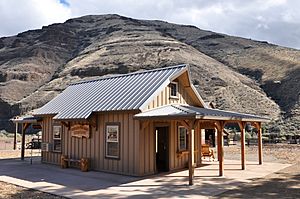Cottonwood Canyon State Park facts for kids
Quick facts for kids Cottonwood Canyon State Park |
|
|---|---|

Information station in the park
|
|
| Lua error in Module:Location_map at line 420: attempt to index field 'wikibase' (a nil value). | |
| Type | Public, state |
| Location | Sherman and Gilliam counties, Oregon |
| Nearest city | Wasco |
| Area | 8,000 acres (3,200 ha) |
| Created | 2013 |
| Operated by | Oregon Parks and Recreation Department |
| Open | All year |
| Website | Cottonwood Canyon State Park |
Cottonwood Canyon State Park is a huge natural area in Oregon. It opened in 2013 and is the second biggest state park in Oregon. The park covers about 8,000 acres (3,200 hectares) along the lower John Day River. The biggest state park in Oregon is Silver Falls State Park.
The park's main office is about a two-hour drive east of Portland. It is located near Oregon Route 206, between the towns of Wasco and Condon. The John Day River flows for about 16 miles (26 km) through the park. It also forms the border between Sherman County and Gilliam County.
The main canyon walls in the park are very tall, reaching up to 1,920 feet (585 meters) above sea level. The park also has four smaller canyons: Hay Creek, Esau, Rattlesnake, and Cottonwood. The canyons are surrounded by grasslands, sagebrush areas, riverbanks, and cliffs. These cliffs are mostly made of basalt rock.
Contents
Park History: How it Began
In 2008, a group called the Western Rivers Conservancy bought the land. This non-profit organization is based in Portland. They bought the land from the Murtha family, who had owned it since the 1930s and used it for cattle ranching.
The conservancy borrowed money to buy the land quickly. Later, Western Rivers offered to sell the land to the Oregon Parks and Recreation Department (OPRD). Their goal was to create a new state park. OPRD agreed and paid the conservancy the same amount they had paid the Murthas, which was $7.86 million. This is how Cottonwood Canyon State Park was created in 2013.
Fun Things to Do in the Park
Cottonwood Canyon State Park offers many exciting activities for visitors. You can go hiking, camping, fishing, and even river rafting.
Camping and Facilities
Near the park's main office, there is a campground. It has 21 basic campsites and 7 special sites for hikers and bikers. There is also a group camping area, fresh drinking water, and a restroom.
Hiking Trails
There are several great hiking trails in the park:
- Pinnacles Trail: This trail is in Sherman County and follows the river downstream for about 4.3 miles (6.9 km).
- Lost Corral Trail: This trail is in Gilliam County and also follows the river downstream for about 4.3 miles (6.9 km).
- Hard Stone Trail: This trail is on the upstream side of the highway and follows the river for about 1.5 miles (2.4 km).
You can also hike on old ranching roads that cross the park. Plus, there's an extra 10,000 acres (4,000 hectares) of public land next to the park. This land is managed by the U.S. Bureau of Land Management and offers even more hiking options.
Horseback Riding and Boating
If you like horses, there are special horse trails in the Gilliam County part of the park. The J. S. Burres day-use area is also in Gilliam County. This is a great spot for boaters to start their trip down the John Day River. It's also where groups finish their river trips that start between Clarno and Route 206.
Hunting
Hunting is allowed in undeveloped parts of the park. However, you must follow the rules set by the Oregon Department of Fish and Wildlife.
Animals and Plants of the Park
Cottonwood Canyon State Park is home to many different kinds of animals and plants.
Wildlife
The park is famous for having the largest group of California bighorn sheep in the area. You might also see Rocky Mountain elk, mule deer, pronghorn, and coyotes. Many smaller mammals live here too.
The park has different types of snakes, including the western rattlesnake. Several kinds of lizards also live in the park. Near the river, you can find frogs, toads, and various waterfowl. The river itself is home to fish like Chinook salmon, steelhead, catfish, carp, and smallmouth bass.
Birds
Many raptors, like American kestrels and Swainson's hawks, fly over the park. Game birds such as the chukar partridge and the ring-necked pheasant live in the higher areas. In the summer, migratory birds like the Bullock's oriole and the lazuli bunting visit the park.
Plants and Flowers
In early May, beautiful flowers like balsamroot and monkey flower bloom in the park. Sagebrush plants bloom later in October. Park workers have also been planting some box elder, chokecherry, and hawthorn trees. These trees will provide shade near the park headquarters.
 | James B. Knighten |
 | Azellia White |
 | Willa Brown |


